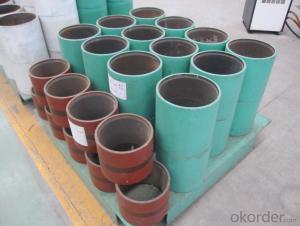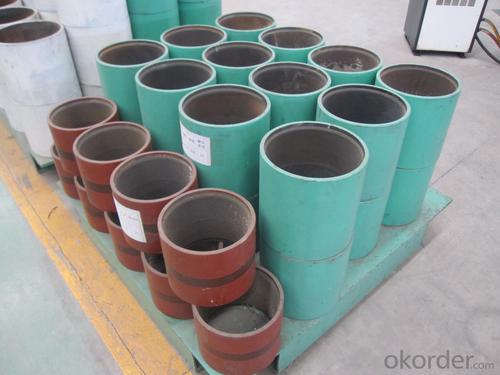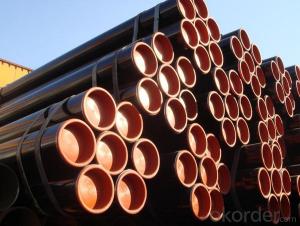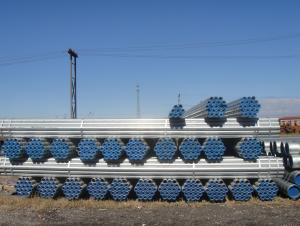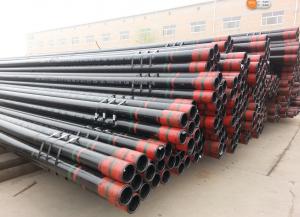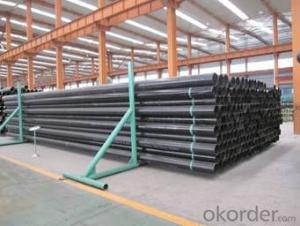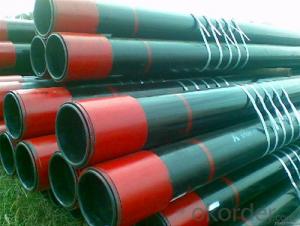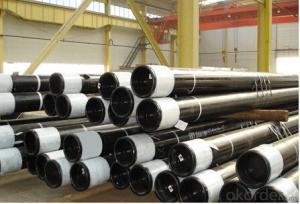API casing pipe thread
- Loading Port:
- China Main Port
- Payment Terms:
- TT OR LC
- Min Order Qty:
- -
- Supply Capability:
- -
OKorder Service Pledge
OKorder Financial Service
You Might Also Like
Std Ref.: API 5CT 5B ISO9001, 2008
Grade: J55,K55, N80-1,N80-Q,L80,C90,P110
Size: tubing 1.9"to4-1/2", casing 4-1/2"to13-3/8"
1.Grade: K55, N80-1, N80-Q, L80, C90, P110
2.We also supply permium thread products by customer's request
3.Size: tubing coupling from 1.9" to 4-1/2",Casing coupling fro4-1/2"to 13-3/8"
4.Type: NU, EU(tubing coupling), STC,LC,BTC(casing coupling).
5.Surface treatment: Whole phosphating, or inside phosphating and outside coating
6.Packing: By carton, wooden case, wooden pallet, or by requirements of customers
Otherwise, Our company manufactures and sells casing and tubing couplings,pup joints, tool joints, adapter pup-joints, adapter couplings, stabilizers, anchors of oil pumps and revolving sand gravitated device of well, etc. We always do business based on the principle of equality and mutual benefit, we provide the high quality and competitive price products.
- Q: What is the difference between carbon steel and alloy steel pipes?
- Carbon steel pipes and alloy steel pipes are two distinct types of steel pipes, characterized by their composition and properties. Carbon steel pipes, consisting mainly of carbon and iron, incorporate small quantities of other elements such as manganese, silicon, and copper. These pipes are renowned for their robustness and durability, making them a favored option in industries like construction, oil and gas, and automotive. Carbon steel pipes are relatively low-priced and exhibit commendable resistance to corrosion. In contrast, alloy steel pipes are produced by introducing additional alloying elements to carbon steel. These alloying elements encompass chromium, nickel, molybdenum, vanadium, and others. The incorporation of these elements augments the steel's properties, resulting in increased strength, superior corrosion resistance, and enhanced heat resistance. Alloy steel pipes are commonly employed in applications involving high temperatures and pressures, such as power plants, refineries, and chemical plants. Regarding cost, alloy steel pipes generally incur higher expenses compared to carbon steel pipes due to the inclusion of supplementary alloying elements. Nevertheless, the added advantages in terms of performance and longevity often justify the elevated cost. To summarize, the primary distinction between carbon steel and alloy steel pipes lies in their composition and properties. Carbon steel pipes primarily consist of carbon and iron, while alloy steel pipes contain additional alloying elements to enhance their properties. Carbon steel pipes are celebrated for their strength and affordability, whereas alloy steel pipes offer improved strength, corrosion resistance, and heat resistance.
- Q: How are steel pipes used in the manufacturing of aerospace components?
- Steel pipes are commonly used in the manufacturing of aerospace components for various purposes such as fuel and hydraulic systems, structural supports, and exhaust systems. These pipes provide strength, durability, and resistance to high temperatures and pressure, making them suitable for critical applications in the aerospace industry.
- Q: How are steel pipes protected against UV radiation?
- Steel pipes are typically protected against UV radiation by applying a coating or paint that contains UV stabilizers. These stabilizers help to prevent the degradation and discoloration of the steel caused by prolonged exposure to sunlight and UV rays.
- Q: How can two smooth steel pipes be joined? The size of the two pipe is different (except for welding)
- Butt fastener: used for connecting two steel pipe jointsThin-walled stainless steel pipe, the national standard consists of three parts, respectively on the thin stainless steel pipe connection, the sealing ring of raw materials of various specifications of O type thin wall stainless steel pipe diameter and wall thickness of pipe and rubber have clear requirements, in order to ensure the quality of the whole pipeline, pipeline safety and guarantee system durability. The connection mode is clamp type and ring type.
- Q: How are steel pipes used in the agriculture industry?
- Steel pipes are used in various ways within the agriculture industry. They are commonly used for irrigation systems, allowing water to be efficiently transported to crops. Steel pipes are also used for drainage systems, ensuring excess water is properly removed from fields. Additionally, steel pipes are used for building structures such as barns, fences, and animal enclosures, providing durability and strength.
- Q: Are steel pipes suitable for use in pharmaceutical industries?
- Yes, steel pipes are suitable for use in pharmaceutical industries. Steel pipes are known for their durability, strength, and resistance to corrosion, making them ideal for transporting various pharmaceutical materials and fluids safely and hygienically. Additionally, steel pipes can withstand high pressure and temperature conditions, ensuring the integrity and efficiency of pharmaceutical manufacturing processes.
- Q: How do you calculate the maximum allowable deflection for steel pipes?
- When calculating the maximum allowable deflection for steel pipes, various factors must be taken into account. These factors include the pipe diameter, material properties, support conditions, and desired level of deflection. The maximum allowable deflection is typically determined according to industry standards and codes. One popular method for calculating the maximum allowable deflection is based on the pipe's span-to-diameter ratio, also known as the L/D ratio. The L/D ratio is calculated by dividing the pipe's span (the distance between supports) by its diameter. Numerous industry codes provide guidelines for the maximum allowable deflection based on the L/D ratio. For instance, the American Society of Mechanical Engineers (ASME) B31.1 Power Piping Code suggests that for carbon steel pipes, the maximum allowable deflection should not exceed 3% of the pipe's span when the L/D ratio is 100 or less. However, as the L/D ratio increases, the deflection limit decreases to ensure the pipe's stability and structural integrity. To calculate the maximum allowable deflection using the L/D ratio method, you first need to determine the L/D ratio based on the pipe's span and diameter. Then, you can refer to the applicable code or standard to find the corresponding maximum allowable deflection limit. It's important to note that other factors, such as the pipe material's yield strength, wall thickness, and the type of loading (e.g., dead load, live load), also influence the maximum allowable deflection. Therefore, it is crucial to consult the relevant industry standards, codes, and engineering principles to accurately calculate the maximum allowable deflection for steel pipes.
- Q: Can steel pipes be used for conveying solid materials?
- Yes, steel pipes can be used for conveying solid materials. Steel pipes are known for their durability and strength, making them suitable for transporting various solid materials such as ores, grains, coal, and construction materials. The smooth interior of steel pipes allows for efficient flow and minimal friction, making them a preferred choice in industries like mining, agriculture, and construction.
- Q: What are the advantages of using steel pipes in marine applications?
- Using steel pipes in marine applications offers several benefits. Firstly, steel pipes possess exceptional durability and a high resistance to corrosion. This is crucial in marine settings where pipes are constantly exposed to saltwater, which can rapidly degrade materials. Steel pipes can withstand these harsh conditions and maintain their structural integrity for extended periods. Another advantage of utilizing steel pipes in marine applications is their strength. Steel is a robust and sturdy material that can endure high pressure and extreme conditions commonly encountered in marine operations. This makes steel pipes ideal for transporting fluids, such as water, oil, and gas, in marine environments. Moreover, steel pipes provide excellent fire resistance. In the event of a fire on a ship or offshore platform, steel pipes act as a reliable fire barrier, preventing the spread of flames and ensuring the safety of personnel and equipment. Furthermore, steel pipes are highly versatile and can be easily fabricated to meet specific requirements. They can be manufactured in various sizes, shapes, and thicknesses, allowing for customization to suit the particular needs of marine applications. Steel pipes can also be easily welded together, creating a seamless and leak-proof system. Lastly, steel pipes prove to be cost-effective in the long run. Although the initial investment may be higher compared to other materials, the durability and longevity of steel pipes make them a cost-efficient choice. With minimal maintenance and a long lifespan, steel pipes reduce the need for frequent replacements, resulting in significant cost savings over time. In conclusion, the advantages of using steel pipes in marine applications include their durability, corrosion resistance, strength, fire resistance, versatility, and cost-effectiveness. These factors make steel pipes a reliable and efficient choice for various marine operations, ensuring the safe and efficient transport of fluids in harsh marine environments.
- Q: How are steel pipes protected against corrosion in marine environments?
- Steel pipes are protected against corrosion in marine environments through various methods, including the use of protective coatings, cathodic protection systems, and selecting corrosion-resistant materials.
Send your message to us
API casing pipe thread
- Loading Port:
- China Main Port
- Payment Terms:
- TT OR LC
- Min Order Qty:
- -
- Supply Capability:
- -
OKorder Service Pledge
OKorder Financial Service
Similar products
Hot products
Hot Searches
Related keywords
